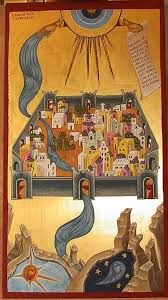The Heavenly Jerusalem
Mount Calvary Church
A Roman Catholic Parish
The Personal Ordinariate of the Chair of S. Peter
Eutaw St. and Madison Ave.
Baltimore, Maryland
Rev. Albert Scharbach, Pastor
Dr. Allen Buskirk, Choirmaster
Trinity XI
September 1, 2019
Summer Schedule
One Mass at 9:00 A.M.
Breakfast following in the undercroft
___________
Anthems
Laudate Dominum, W. A. Mozart
Laudate Dominum omnes gentes
Laudate eum, omnes populi
Quoniam confirmata est
Super nos misericordia eius,
Et veritas Domini manet in aeternum.
Gloria Patri et Filio
et Spiritui Sancto.
Sicut erat in principio, et nunc, et semper.
Et in saecula saeculorum. Amen.
Praise the Lord, all nations;
Praise Him, all people.
For He has bestowed
His mercy upon us,
And the truth of the Lord endures forever.
Glory to the Father and to the Son
and to the Holy Spirit,
as it was in the beginning, is now, and forever,
and for generations of generations. Amen.
_____
Ave verum corpus, W. A. Mozart
Ave verum corpus natum
ex Maria virgine,
vere passum immolatum
in cruce pro homine,
cuius latus perforatum
unda fluxit sanguine,
esto nobis praegustatum
mortis in examine.
Hail, true Body, born
of the Virgin Mary,
who having truly suffered, was sacrificed
on the cross for mankind,
whose pierced side
flowed with water and blood:
May it be for us a foretaste [of the Heavenly banquet]
in the trial of death.
__________
Hymns
Glorious things of thee are spoken was written by John Newton (1725—1807), sometime slave trader and author of Amazing Grace, with the help of William Cowper (1731—1800). The opening line quotes Psalm 87:3 “Glorious things of you are spoken, O city of God.” The theme is the universal church. The text begins with a vision of the new city of God (Heb 12:22), founded on the rock of ages (2 Sam 22), from which flow streams of living waters (Rev 22), alluding to the rock that Moses truck in the desert, to the Gihon spring on Mount Zion, and to the living water that Jesus promised the women at the well. The third stanza names the cloud and fire — the enduring presence God in the church —, and the manna (Ex 13:21, 16:31), a symbol of the Eucharist. We are washed in the Blood of the Lamb, making us Kings and priests to our God, to Whom we offer in Jesus the sacrifice of our lives in praise and thanksgiving for the salvation He has wrought.
The tune, AUSTRIA, by Haydn, created problems for England during World War II and was replaced by a newly composed tune, but we are using the 18thcentury melody, which also appears in the Emperor quartet, opus 70, no. 5.
Jerusalem, my happy home has a complicated history. It may have been written by a 16th century Catholic priest “F. B. P” (¿Francis Baker Porter?) imprisoned in the Tower and it may be based on The Meditations of St. Augustine. It exists in several versions; the one we use was said to be the favorite hymn of Elizabeth Ann Seton.
As adults, we know we live in a vale of tears: the disappointments of life, the sickness and death of friends and family, the destruction that evil works in God’s creation. This world as it now exists is not our home, which we will find in the transfigured world of the New Creation. The disharmony of the present age will be replaced by the harmony of heaven, symbolized by music, the new song, canticum novum, that we will forever sing. As the Navajos say, Hózhó Nahasdlii: It is finished in beauty.
LAND OF REST is an American folk tune with roots in the ballads of northern England and Scotland. It was known throughout the Appalachians; a shape-note version of the tune was published in The Sacred Harp (1844).
Love divine, all loves excelling is by Charles Wesley (1707—1788). The hymn is a prayer: through the incarnate Christ, we pray for the indwelling of the Holy Spirit, and ask that we would never be separated from the love of God in Christ, who works in us and through us until our time on earth is done.
One of the most loved Welsh tunes, HYFRODOL was composed by Rowland Hugh Prichard (1811—1887) in 1830 when he was only nineteen.
